
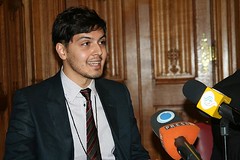
From left to right: Lord Avebury, Baroness Falkner and Omar Ahmad
11 Oct 2010
The Press Conference held today at Room 3, the House of Lords, highlighted the latest report by the Islamic Human Rights Commission, titled “Broken Promises”, prepared by Omar Ahmad.
Lord Avebury inaugurated the meeting which was attended by several news channels and human rights bodies. At least two British public relations companies sent their staff to monitor the event.
Lord Avebury started by welcoming the audience and said that this is the second press conference in few weeks. This is unusual situation. None of our pleas to open access to detainees has been heeded.


From left to right: Lord Avebury, Baroness Falkner and Omar Ahmad
11 Oct 2010
The Press Conference held today at Room 3, the House of Lords, highlighted the latest report by the Islamic Human Rights Commission, titled “Broken Promises”, prepared by Omar Ahmad.
Lord Avebury inaugurated the meeting which was attended by several news channels and human rights bodies. At least two British public relations companies sent their staff to monitor the event.
Lord Avebury started by welcoming the audience and said that this is the second press conference in few weeks. This is unusual situation. None of our pleas to open access to detainees has been heeded. There were some visits by families but were warned not to ask questions from the detainees about their torture or tell them about what is happening outside about their case. Lawyers had little access and were warned against talking about the ordeal of the detainees. There have been protests on almost daily basis. The people are conscious over detentions without trials. We need to consider what further actions need to be taken. The Human Rights Council in Geneva needs to be involved. Last week, we had a question session at the House of Lords about detainees. Baroness Falkner put some questions to the Minister, Lord Howell. I proposed allowing the UN Special Rapporteurs on Torture, Arbitrary Detention and the Protection of Human Rights Defenders. These Rapporteurs must ask for visits to Bahraini jails. Our Minister said that a favorable reply was possible. We wrote to the Special Rapporteurs. No visit has ever taken place before. Today, we are also launching the special report by the Islamic Commission for Human Rights.
Then Baroness Falkner delivered some remarks about the situation. She said that the view among the Western Governments is that those in the Gulf who had elections in Gulf countries did well, and that would lead to domino effect. Tolerance to low level of transgression of human rights would lead to better political outcome. In the past few months this proved to be wrong. They believed a bit of human rights violations was good. We now see that in Bahrain this did not work. If we listened to Bahrain’s Terrorism Bill 2006, we would have been vigilant. We were naive in the West, that low level conversation with some officials would lead to good outcome. We were wrong.
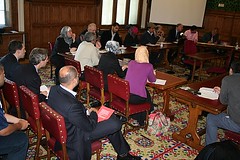
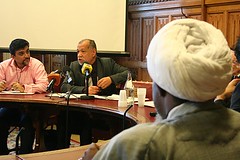
She said that on 5th August I chaired a meeting at the House of Lords. Later I found out that three of those who had attended were subsequently arrested. That is outrageous. The Bahraini Ambassador said we were naive claiming that other states were involved without naming one. I said most countries have other countries with whom they cannot go on well. Even democratic countries have this problem. When I mentioned our anxiety to him, the Bahraini Ambassador did not understand. Then we met our Foreign Secretary and he intervened by calling the Crown Prince of Bahrain about Mr Jaffar Al Hesabi. Last week the Bar Human Rights Committee published their fantastic report. They were extremely concerned. There are now calls for Special Rapporteurs to visit Bahrain. The Bar Human Rights Committee wants to meet Bahraini lawyers during their current visit, but those lawyers would not be able to disclose the details of the detainees terrible experiences. The Bar delegation likes to meet the ministers involved. I am also told that there will be peers to Bahrain later this month. Lord Avebury and myself have not been invited to go on this trip. This means that we are not trusted because we raised such issues. I told Ambassador unless there is dialog with those in jail there will be no lasting solution. The Ambassador was naive to deny the need for such dialog. If there is a delegation we must be part of it.
Lord Avebury then said; After 5th August meeting three of those who attended were arrested. That was bad. It means there is no dialog with opposition.
Baroness Falkner then said that when she told the Ambassador that some of the prisoners were detained because they had met me, he denied that. Then I produced the Al Watan newspaper, which is loyal to the regime and showed him the main photo that was used to prove their guilt. It was a photo taken during the meeting of 5th August, including myself.
Then Omar Ahmad, the author of ICHR’s report spoke. He said that on 13th August, Dr Al Singace was arrested. The wheel chair, polio-riddled activist was severely tortured. Other detainees are Sheikh Mohammad Habib Al Miqdad, Abdul Ghani Khanjar and Abdul Hadi Al Saffar. In the report we dealt with thematic issues of human rights violations, repression, exclusion of the majority etc. It contains details of a sour history. It dealt with reforms under Hamad who had pledged to change the situation. Although he disbanded the State Security Court, little else has been done. He indicated he was for dialog and held a referendum on the Charter. But he reneged on his pledges and undermined the 1973 Constitution. His promises of reforms were inadequate. There were many utterances but little action. There is also the charges of corruption and nepotism. It seems that the system cannot be reformed. The report deals with discrimination, repression, migrants workers (estimated at 455,000), construction and domestic labor and a list of human rights problems. In 1999, the Shia occupied 20 percent of high office, but representation is much less now. Human rights violations have now become symptomatic of a weak government, and torture is used extensively. Since 2007 torture has become a routine treatment of prisoners including the use of electric shocks and hanging. Bahrain is now at crossroads. The elections are undermined by continuous harassment. Bahrain speaks of reform but power is still concentrated in the hands of the Al Khalifa. We made several recommendations; the need to have transparency at all levels, eradication of corruption by senior Al Khalifa, respect of the rights of the migrant workers, ending the systematic discrimination against the Shia especially in the fields of security, defense and general employment, stop the demographic engineering, grant detainees legal representation, the torture must be investigated, the prohibition of torture, the release of the prisoners of conscience, allow free press. For this to be achieved the international community must question the government. The recent tensions are the latest episode in the conflict between the Al Khalifa and the people, sources of which lie in the problems with housing, unemployment, exclusion and corruption.
Lord Avebury then commented by saying that forcing the disabled Al Singace to crawl to reach the bathroom is absolutely disgusting.
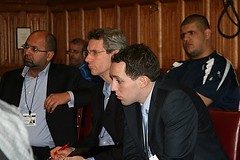
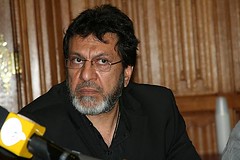
Massoud Shajarah, the President of ICHR said that we should tell the Al Khalifa that there is opportunity to improve the situation through dialog, cooperation with the people and respect of the majority.
David Gotlib, who went to Bahrain in March 2009 during the detention of Mr Hassan Mushaime and Sheikh Mohammad Habib Al Miqdad, spoke briefly about his experience. He said when we went to Bahrain, we realized our FCO was not doing enough. He suggested to build a core of lawyers who will stand up for the human rights violations. We could help and support Bahraini lawyers.
Then Usama Danshyar, another lawyer who visited Bahrain last year raised the possibility of training Bahraini lawyers, and then they can take a role in Bahrain. The Bahraini government will then be talking to a member of the Bar. The Bar human rights committee and Council are ready to help. In Pakistan the government had to back down when the Bar and judiciary took strong stands. If our government can fund some lawyers then that will make the task easier.
Hassan Mushaime said few words. He said that we have a government which is a biological liar. They talk of burning tyres and present this as terrorism. Peaceful activists are banned. When they allowed some families to visit their sons in jails, they forced the detainees to wear heavy and thick clothes to hide their injuries, and prevented them from talking about their ordeals.
Saeed Shehabi talked about “Torture, Money and Services” arguing that even in this room there are victims who are ready to testify about the torture they had endured. He said the FCO is not serious to intercede on behalf of Jaffar Al Hesabi, who is a UK national undergoing extensive torture in Bahraini jails. He also talked of the infliction of punishment before the crime is proven, such as the case with Ahmad Jawad Al Fardan whose house was taken by the regime immediately after his arrest, and Abdul Ghani Khanjar and Dr Abdul Jalil Al Singace whose employment was terminated after their arrest. He complimented the ICHR report and called for implementation of its recommendations.
View more photos of the conference
Video coverage on Al-Alam Tv [Arabic]
